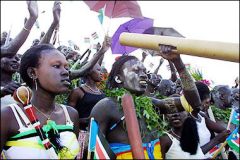Sudan split or united? Southerners will decide
By William Maclean
NAIROBI, Jan 9 (Reuters) – Sudan could split in two and the oil-exporting south form a new nation under a pact to be signed on Sunday ending a north-south war in Africa’s largest country.

|
|
Jubilant Sudanese youth in traditional attire sing and dance during the signing of a final peace accord beteween the Sudanese government and the rebel Sudan People’s Liberation Movement/Army (SPLM/A) in Nairobi, Jan 9, 2004.(AFP) . |
Under the agreement, southerners have the right to vote for secession at the end of a six-year interim period, a concession granted by the Islamist government in response to the rebels’ core demand for the right of self-determination for the south.
The moment will provide a high-profile test of a principle long cherished by post-independence Africa of the sanctity of colonial borders. And if separation is the choice, major powers will have to decide whether they should respect the wishes of one of Africa’s most impoverished and marginalised communities.
John Garang’s rebel Sudan People’s Liberation Movement (SPLM) has fought a civil war for more autonomy for the largely animist and Christian south for 21 years. Two million people have been killed and four million uprooted in the conflict.
The accords give the SPLM a slice of national power, with Garang becoming Sudan’s First Vice President.
But Garang suggested on Saturday that national power would mean little if there was no development of the south, where 7.5 million people living in rebel-held areas are prey to perennial hunger and in dire need of roads, schools, phones and hospitals.
Speaking at a news conference, Garang said impoverished southerners may not want to stay part of Sudan unless a new central government spends money on improving their lives.
“MAKE UNITY ATTRACTIVE”
“If this agreement is dishonored the country will break up, but if it is implemented the way it has been negotiated, there are good chances the country can remain united,” he said.
“In the past unity has been based on coercion and force. It has not worked. It will not work. So let us change gears and develop the necessary conditions to make unity attractive.”
Khartoum officials have said they are able to gamble on the referendum as they are confident the SPLM, grown used to sharing power and oil riches in a national unity government during the six year transition period, will end up campaigning for unity.
They also feel the international community would tacitly support a unity vote, fearful of the consequences for the stability of the Horn of Africa — and Sudanese oil exports — if Africa’s largest country were to break apart.
The African Union (AU), successor to the former Organization of African Unity, upholds the sanctity of Africa’s inherited borders, arguing that alterations may stir fresh conflict on a continent where frontiers drawn by European powers have already caused endless bloodshed by cutting across tribal territories.
But experts say anecdotal evidence of southern opinion points clearly in one direction — that if a vote were taken today, southerners would vote en masse for secession.
The new interim unity government, and a new regional authority to be run by Garang called the Government of South Sudan, will have its work cut out to develop the south to a level where southerners warm to Khartoum, they say.
“HELP US BUILD ROADS”
“Help us build roads and then people will say there is a value in having unity,” Garang told a journalist from Kuwait, referring to the Gulf Arab oil power’s African aid projects.
“The challenge is for those who value the unity of Sudan. If during the six years, southerners are persuaded it is in their best interests to belong to a bigger entity called the Sudan, then there is a good chance that Sudan shall remain united.”
Rebel-held parts of the south have none of the state schools and hospitals seen, albeit at varying levels of development, in government-held areas, including regions such as Darfur.
A recent report estimates that in rebel-held areas in the south, daily per person income is 25 U.S. cents, a total of $90 all year — about four times lower than government-held areas.
The statistics come from a report produced by a Sudanese research group affiliated to the SPLM written in association with U.N. Children’s Fund with help from the World Bank, World Food Program and other U.N. agencies.
